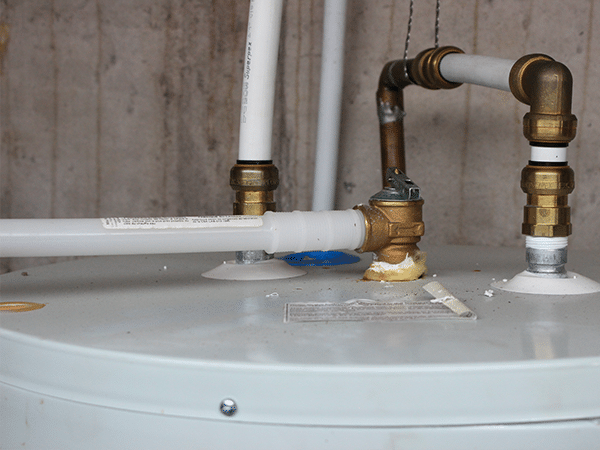FAQ
This section contains all the frequently asked questions about water heater and anode rod.

Anode Rod
In most cases, water heater anode rods are universal. The only exceptions are :
Buderus : They use another type of threading to install the magnesium anode.
Bradford White : Some model have the anode is built into the hot water outlet.
All other water heater brands use a regular magnesium anode with 3/4 ” NPT threads.
Corro-Protec anodes are designed to fit any hot water tank on the market. You can see all models on the following link : Residential and Commercial Water Heater Anode.
Yes, it is even highly recommended to install an imposed current anode if you have a water softener.
The water softener generally makes the water more aggressive to the tanks, which reduces the life of your hot water tank and creates a more conducive environment for the development of Sulfur Reducing Bacteria that creates the rotten egg smell in hot water. The Corro-Protec Powered anode rod will automatically adjust to provide optimum rust protection.
Blog
How Does a Water Softener Work: A Detailed Explanation
Water softening is a process that can greatly improve the quality of your water and extend the life of your appliances, especially water heaters. However, […]
Effective Strategies to Remove Sulfur Smell from Your Hot Water Heater
Many homeowners face the unpleasant sulfur smell in hot water. This odor, often resembling rotten eggs, can make using hot water for daily tasks unpleasant. […]
Limescale may form if the anode is too close to the walls of the hot water tank and the current flows too quickly between the anode rod and the tank. Corro-Protec powered anode, unlike other anodes, has a design that prevents this type of reaction. Indeed, the white plastic present in the top of the titanium anode prevents this kind of reaction and ensures that the anode is well positioned in the tank.
The answer is YES. Since the sacrificial anode must sacrifice itself to protect the hot water tank, it is important that the anode is large enough to last for several years. However, the powered anodes rod do not work in the same way, so they are much smaller.
A powered anode related to electricity being fed into the anode to impose a flow of current rather than relying on natural electrolysis. The length and size of the anode, as well as the current sent by the rectifier will influence the life expectancy of the anode. Corro-Protec anodes have been designed to work for more than 40 years, no matter how hard your water is. In order to know more about the lifetime of the current anodes, I invite you to visit our blog post: Tests of Powered Anode
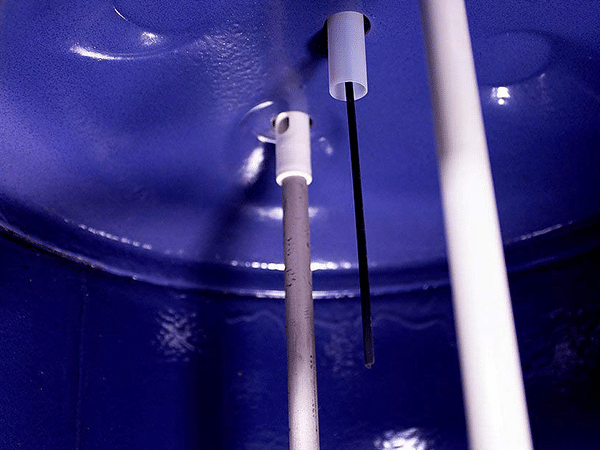
Our Corro-Protec anodes are made from titanium and coated with MMO, which improves their performance.
The stability of MMO (mixed metal oxide) coated titanium anodes have been used for almost 30 years. MMO coated titanium anodes are used in various environments such as seawater brackish water fresh water carbon backfill and concrete.
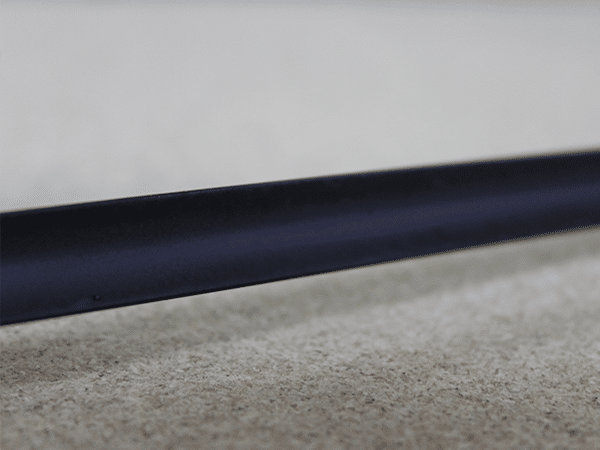
A powered anode is a non-sacrificial anodes that use a current rectifier, plugged into an electrical outlet, which sends current in the hot water tank through a titanium anode.
Unlike sacrificial anodes, powered anodes are maintenance free and designed to last for years. Plus, they are well known to solve rotten egg odor problems in hot water tanks.
Health
It is very difficult to answer this question, because no one wants to take a clear position on the subject. However, several studies suggest that aluminum may be a contributing factor to Alzheimer’s disease.
Knowing that an aluminum anode dissolves over time, it is normal to conclude that aluminum particles will end up in your hot water. Even if you do not consume the hot water directly, you are in contact with it when you take a bath or a shower.
Very often, plumber offer to change magnesium anode for an aluminium anode in order to try to fix the rotten egg smell in the hot water. You should know that better solution exists such as Corro-Protec Powered anode rod.
No. Since Titanium Powered Anodes are stable, there is no metallic leaching in the concerned environment and therefore no residual pollution.
Yes, powered anode rods are safe for use in water heaters. Their design and operation principles are carefully formulated to ensure safety and effectiveness.
One concern that some people might have is the introduction of electrical current into the water. However, the amount of current used by powered anode rods is very minimal and safe. This small current is precisely what prevents the corrosive reaction that causes rusting in the water tank.
Additionally, unlike sacrificial anodes that deteriorate over time due to the electrochemical process, powered anodes do not decompose. This means there is no breakdown of material that could potentially affect the water quality or the safety of the system.
Furthermore, companies like Corro-Protec prioritize the safety of their products. They ensure stringent quality control during manufacturing and carry out continuous testing to guarantee the products meet and exceed safety standards. Thus, you can confidently use a Corro-Protec powered anode rod in your water heater, knowing it is safe and effective in protecting your tank from corrosion.
Yes, the use of electricity in water heaters by Corro-Protec’s system is safe. They use Impressed Current Cathodic Protection (ICCP) for their anode rods in water heaters. This method uses a low voltage DC power source to protect the water heater from corrosion.
Impressed Current Cathodic Protection (ICCP) is a widely used method for protecting a variety of metal structures submerged in water from corrosion. Here are a few examples:
- Sea Vessels: In the maritime industry, ICCP systems are installed on ships and submarines to prevent the corrosive effects of seawater. This system uses an external power source to generate a protective electric current that counteracts the corrosion process, ensuring the vessel’s hull remains intact.
- Piers and Harbors: ICCP systems are also used to protect piers, wharves, and offshore platforms from the constant threat of corrosion. These structures, being in direct contact with seawater, can quickly degrade without such protection. ICCP systems ensure the longevity of these important infrastructures.
- Underground and Underwater Pipelines: ICCP is widely used to protect pipelines carrying water or other substances. Given their often inaccessible locations, ICCP’s reliable and low-maintenance nature makes it an ideal choice for protecting these vital infrastructures.
Installation
Yes, the Corro-Protec System is a universal anode rod that adapts to any type of steel or stainless steel hot water tank. However, to maximise anode performance and reduce selling price, there is four different Corro-Protec model available. Click HERE to find the perfect Corro-Protec anode for your hot water tank.
Since Bradford White water heaters have the magnesium anode built into the hot water outlet, we need to do a few extra steps to install a powered anode rod. Please see following link : https://www.corroprotec.com/installation-guide/
The Corro-Protec Integrated Anode Rod is designed to fit most Bradford White* water heater will come with everything you need to install it in the hot water outlet where the original magnesium anode rod was installed.
*Bradford White is a registered trademark of Bradford White Corporation. Corro-Protec is not affiliated with, endorsed by, or sponsored by Bradford White Corporation.
Older Corro-Protec models for hot water outlet anodes required multiple fittings to assemble, unlike our new patent-pending one-piece Wye fitting. These older fittings cannot be used with a standard Corro-Protec in the hot water outlet port, as it will restrict water flow. For proper installation, you need our specialized hot water outlet Corro-Protec model.
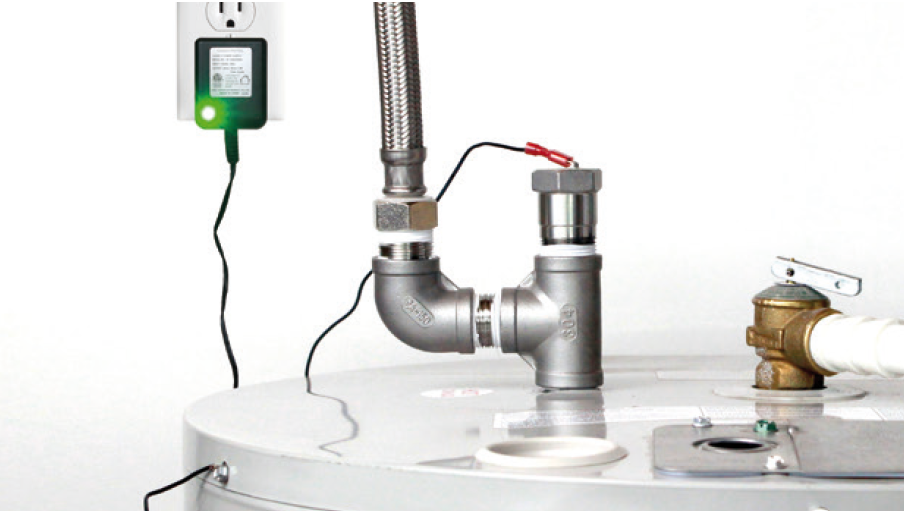
Yes, it is possible to install Corro-Protec by yourself. With all tools needed, it will take you about 15 minutes to install it.
A complete step-by-step guide is included inside the box for an easy installation. Each guide are also available on this page: https://www.corroprotec.com/installation-guide/
The answer is no and that is why Corro-Protec offers different models adapted to tank sizes.
If your water heater has two anodes, you can replace one of them with our Corro-Protec imposed current anode and leave the other one in place. Even if you install the Corro-Protec anode to eliminate the rotten egg smell in your hot water, you don’t need to remove the second magnesium anode.
While the installation of a Corro-Protec Powered Anode Rod does not necessarily require a torque measurement, if you choose to use one, aim for about 22 foot-pounds. This range is a general guideline to ensure a secure fit without applying excessive force, which could potentially damage the water heater’s tank or threads.
Maintenance
The Corro-Protec does not require any special maintenance. Leave it connected at all times, and it will work only if necessary. Even if you turn off the hot water tank, if there is still water in the tank, the Corro-Protec will remain functional to prevent corrosion. If you empty the tank, the Corro-Protec will turn off automatically because the water acts as a conductor between the anode and the ground.
An impressed current anode does not function as a heating element. There is no danger in emptying the water from the tank without disconnecting the anode.
It is possible to find rust residues in your hot water after the installation of a Powered Anode Rod. The anode cleans the tank, so residues will be present in the water throughout the cleaning process.
People often look for water hater overflow pipe but the real term is Water Heater Pressure and Temperature relief valve. We have a complete blog post about it : Water Heater Pressure Relief Valve
Rectifier
The voltage automatically adjusts based on the resistance of your water. If there’s a very low voltage, it suggests that your water is highly conductive. In such situations, the anode doesn’t require a large current to ensure adequate protection. The key factor to consider is the mA level within the water heater. Importantly, there’s no need to measure the voltage; if any issue arises, the Corro-Protec power supply’s green light will turn off. This light is designed to illuminate only when a specific current threshold is achieved, indicating that the protection mechanism is operational.
Yes, The Corro-Protec rectifier meets the following requirements:
- Conforms to UL STD. 1310
- Certified to CSA STD. C22.2 NO.223
If you want to learn more about the tests performed on our anodes, visit : https://www.corroprotec.com/blog/tests-of-powered-anode-iccp/
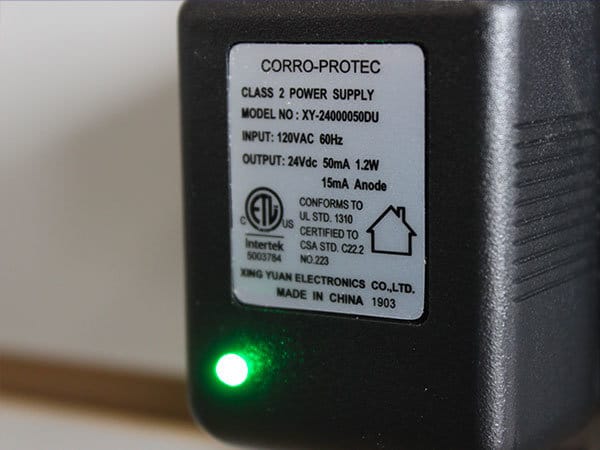
To ensure that the cathodic protection works, the following conditions must be met:
- The rectifier must be connected
- Corro-Protec must be connected to the rectifier
- The negative side must be installed on the water heater, as indicated in the instruction manual.
- The water heater must be functional (filled and operational)
If the above conditions are met and the indicator light is not lit, please contact us to complete a claim at: https://www.corroprotec.com/troubleshooting-and-warranty-claim/
Our powered anode rod can protect your water heater tank from corrosion and rust, extend the service life of your water tank, remove the rotten egg/sulfur smell in 24 hours, so that you can have clean, tasteless hot water. A green LED light on the power supply allows you to check if the system is running properly, making your life easier and more convenient
Since the amount of current used by the anode will vary from region to region due to the hardness of the water, it is impossible to give an exact answer.
However, on average, the anode will use 10 kWh per year. If we take the average price of electricity in the United States, the cost to run the anode 24 hours a day all year round is $ 1.36 or about a third of a penny per day.
Warranty
Yes, all Corro-Protec system come with a 20 years limited warranty. To register your system, please complete the following form: Warranty.
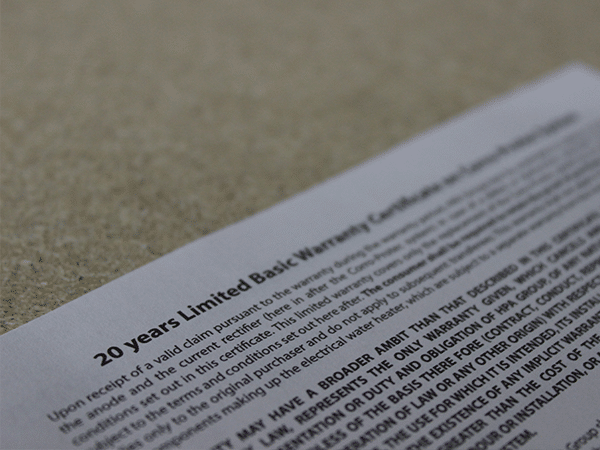
Anode Rod - General
Yes, you can cut your sacrificial anode rod, whether it is magnesium or aluminum, to replace it. To do this, use a pair of gloves and a saw and cut as you remove the old anode. However, when you cut the anode, make sure that the bottom part does not fall into the bottom of the tank, as you will not be able to pull it out.
In confined spaces, cutting the anode rod technique is often used. Make sure to dispose the old anode rod in a safe way and as per your environmental waste regulations in your municipality.
If you don’t have enough space and you are tired of changing the anode rod, you should install a powered anode. Only 12 inches long, this anode is made to last over 20 years.
The length of the anode rod is important in the case of a sacrificial anode. Indeed, as its name suggests, it sacrifices itself to protect your tank from corrosion. As a result, the more magnesium or aluminum there is on the anode, the longer the protection time of your water heater will be.
You can remove the bad smell in your hot water by removing the reacting magnesium anode rod that comes in contact with the magnesium in the water. However, this deprives your water heater of its only protection against rust. You can choose an aluminum anode rod that requires more maintenance or the titanium Corro-Protec impressed current anode that eliminates unpleasant odours and offers 20 years of protection against rust.
When the anode rod in your water heater no longer works due to wear and tear, it is important to replace your sacrificial anode with a new one. Indeed, this type of magnesium or aluminium anode protects the walls against rust by dissolving its alloy. Another solution is to purchase a Corro-Protec impressed current anode to double the life of your water heater against corrosion and water damage and eliminate unpleasant odours.
It is important to inspect the sacrificial anode every 1 to 3 years and replace it after more than 50% of its wear and tear to prevent corrosion of your tank. Its lifespan depends on the quality of your water. On average, the magnesium or aluminum anode must be changed every 3-5 years. For a powered titanium anode rod, it must be changed every 20 years.
Depending on the corrosiveness of your water, a regular anode rod may only last a few years. Our titanium anode rods work with electricity to stops corrosion, reduces limescale buildup and solve hot water smell. Corro-Protec reduces your chances of water heater leaking and extends the life of the tank.
You can buy a magnesium or aluminum sacrificial anode rod from a plumber, hardware store or on the Internet. There are also titanium impressed current anodes available on the Corro-Protec website that double the life of your water heater.
For your water heater, you have the choice between a sacrificial anode rod or an impressed current anode. As its name suggests, the magnesium or aluminum sacrificial anode dissolves over time to protect the surface of your water heater. The Corro-Protec impressed current anode forms a permanent protective layer on the tank walls.
To treat smelly water, it is recommended to use the Corro-Protec anode rod. This anode rod eliminates the bacteria responsible for the rotten egg smell in less than 24 hours. In addition, the Corro-Protec doubles the life of your water heater, unlike a sacrificial anode.
It is preferable to choose a Corro-Protec impressed current anode in order to double the life of your water heater and eliminate unpleasant odours. For the sacrificial anode, it is recommended to use a magnesium anode, as aluminium residues that may be found in the water are harmful to health.
The size of your anode depends on your anode type and the capacity of your water heater. In the case of a sacrificial anode, its rod is much larger than an impressed current anode, because the more material there is, the longer it offers a protection time.For the Corro- Protec impressed current anode, its protection is provided by an electrical current that is proportional to the capacity in gallons of your water heater and not to the size of its rod.
If your hot water smells like oil, it is possible that the water supply or plumbing has been contaminated with gasoline, oil or bacteria. This can be a health risk. In rarer cases, you may notice an oil smell in a new water heater caused by a chemical reaction between the water and the tank components. This should disappear in a few weeks.
A rotten egg smell in your hot water can be caused by various factors. If you can only smell this smell on your kitchen faucet, it could be due to the fact that the drain is partially blocked by decomposing remains. The odour can also come from your water purifier if it is not regularly maintained. In most cases, a sulphur odour is caused by water with a high magnesium content that comes into contact with the original magnesium anode. The Corro-Protec anode is the ideal solution to this problem, because in addition to eliminating odours in a few hours, the anode stops the corrosion of your water heater and is guaranteed for 20 years.
If your water smell like sewage, your plumbing and supply may contain iron, algae, bacteria or decomposing organic matter. This problem may be due to the season of the year and may pose a health risk. During periods of limited use, water can become stagnant and develop these odour through stagnation and the presence of bacteria.
If your hot water smells like onions, it can be caused by different factors. Here is a list of the main factors:
- A prolonged absence can dry out the pipes and lead to onion and sewer odour
- A clogged drain
- Incorrect temperature setting of the water heater that causes bacteria to grow
- The metal in the water heater tank
If your water smells like rotten eggs, it’s likely due to a gas called hydrogen sulfide. This gas forms in your water heater tank during a process called electrolysis. The solution to this smelly water problem? Get the best anode rod for smelly water!
The Corro-Protec powered anode rod is the best anode rod to solve the smelly water once and forall. this powered anode rod is using a tiny bit of electricity to protect your tank from rusting. This also helps to reduce hydrogen sulfide gas, which causes that unpleasant sulfur smell in hot water. Corro-Protec rods last a long time, often even longer than your water heater. So, you’ll save time and money on maintenance and replacements making it the best anode rod for smelly water!
But there’s another choice: aluminum anode rods. These include aluminum-zinc alloy rods and are cheaper than powered rods. They do a good job in soft water conditions and can protect your tank from rusting too. But they might not completely get rid of the smelly water, especially in hot water. Also, these rods wear out quicker, so you’ll need to replace them more often.
So, what’s the best water heater anode rod for smelly water? It depends on a few things: how much you want to spend, the type of water in your area (especially if you use a water softener), and how long you plan to stay in your current home. If you want a long-lasting fix, go for the Corro-Protec anode rod. But if you want a quick, cheap fix and don’t mind replacing the anode rod often, an aluminum rod could work too.
Another approach to tackle the smelly water problem involves removing the anode rod completely. This eliminates the source of hydrogen sulfide gas production. However, it’s important to note that the anode rod’s function is to protect the water heater tank from rusting. Removing it entirely may resolve the odor issue, but it can also accelerate the corrosion of your tank, leading to a shorter lifespan of the water heater. This is why most professionals recommend replacing the anode rod rather than completely removing it.
If the odor persists, a bleach treatment could be considered. By flushing the water heater with a bleach solution, you can kill the bacteria responsible for creating the hydrogen sulfide gas. However, this is typically a temporary fix, and the rotten egg odor may return over time. It’s crucial to follow the manufacturer’s instructions or hire a professional for this process, as overuse of bleach can also cause damage to your water heater tank.
Remember, the aim is to not only get rid of the smelly water but also ensure the longevity of your water heater. Balancing these two objectives can guide you to the best solution.
Anode Rod - Location
The location of the anode rod in your water heater depends on the model of your tank.Refer to your water heater’s user guide for more information .In most cases, the magnesium or aluminum sacrificial anode rod is located on top and is located under a plastic cover. Ask for a professional if necessary.
The anode rod in your AO Smith water heater is located on top of your tank. For most AO Smith water heaters, the anode rod is located in a dedicated anode port and can typically be found under a plastic cap and a foam-insulated layer on the top of the tank. It may be necessary to remove this insulation to gain access to the rod.
Here are some standard locations of the water heater anode rod :

UNCERTAIN ABOUT THE LOCATION OF THE EXISTING ANODE ?
Consult your AO Smith digital or printed water heater owner’s manual for easy guidance.
The anode rod in your electric water heater is typically found at the top of the tank, concealed under a plastic cap and insulation. You will need to remove these components to access the rod. This is the case for almost all electric water heater models. However, it’s important to note that for Bradford White tanks, the anode rod is usually located in the hot water outlet port.
To determine the exact location in your specific model, please refer to your water heater’s user manual. For your convenience, here are links to anode rod locations for several popular brands:
The anode rod in your General Electric (GE) water heater is located on top of your tank. When you are facing the front of your water heater, the sacrificial magnesium or aluminum anode is located at the back of the vent pipe. Refer to your water heater’s user guide for more information.
The anode rod in your Reliance water heater is located on top of your tank. For most Reliance water heaters, the anode rod is located in a dedicated anode port and can typically be found under a plastic cap and a foam-insulated layer on the top of the tank. It may be necessary to remove this insulation to gain access to the rod.
Here are some standard locations of the water heater anode rod :

UNCERTAIN ABOUT THE LOCATION OF THE EXISTING ANODE ?
Consult your Reliance digital or printed water heater owner’s manual for easy guidance.
The anode rod in your Rheem water heater is located on top of your tank. For most Rheem water heaters, the anode rod is located in a dedicated anode port and can typically be found under a plastic cap and a foam-insulated layer on the top of the tank. It may be necessary to remove this insulation to gain access to the rod.
Here are some standard locations of the water heater anode rod :

UNCERTAIN ABOUT THE LOCATION OF THE EXISTING ANODE ?
Consult your Rheem digital or printed water heater owner’s manual for easy guidance.
Bradford White Water Heater Have Integrated Anode Rod
The anode rod in your Bradford White water heater is located at the hot water outlet of your tank. Unfortunately, it is not easily accessible. You must remove the hot water outlet to access it. Some newer Bradford White models have an anode rod which is not located in the hot water outlet, but in a dedicated port for this anode.
If you’re tired of yearly checks on the anode in your Bradford White water heater or experiencing a sulfur smell in your hot water, we have a reliable solution for you. By installing the Corro-Protec powered anode, you can eliminate the need for frequent inspections and enjoy maintenance-free water heater protection.
The Corro-Protec powered anode rod effectively stops corrosion, eliminates the sulfur smell, requires no maintenance, and comes with a 20-year guarantee for your peace of mind. With this innovative solution, you can ensure long-lasting performance without the hassle of annual anode checks.
Having Trouble Finding It?
Contact-us with your Bradford White water heater model number and we would be happy to help you locate it.
You can also contact the manufacturer directly. With Bradford White’s customer support, you can rely on their expertise to help you locate the anode rod in your specific model, such as the Bradford White RG250T6N. Their dedicated team is ready to assist you in finding the exact placement of the anode rod, ensuring you have all the information you need to keep your water heater in optimal condition.
Frequent Water Heater Problems
Adjusting the temperature of your water heater, whether it’s a gas or electric model, can help optimize the heat of your tap water and potentially lower utility bills. Here are step-by-step instructions for both types of heaters:
For Gas Water Heaters:
- Locate the control knob on your gas water heater, typically found near the bottom of the tank.
- You should see a dial with markings such as “Low,” “Medium,” and “High,” or it may display temperature degrees.
- To adjust the temperature, simply turn the dial. For energy efficiency and safety, it’s often recommended that your hot water heater is set around 120 degrees Fahrenheit (48 degrees Celsius). However, some households prefer setting the temperature up to 140 degrees Fahrenheit for higher temperature water.
- Once adjusted, you may need to relight the pilot light following the instructions specific to your model.
- Allow a few hours for the water heater to heat water at the new setting before you test the water temperature.
For Electric Water Heaters:
- For safety, first turn off the power to the water heater from your home’s main circuit breaker.
- Remove the access panel cover on the side of your electric water heater with a screwdriver. Some models have two panels: an upper and a lower one.
- Pull back the insulation to reveal the thermostat.
- Use a flathead screwdriver to adjust the temperature. As with a gas water heater, it’s generally recommended to set it between 120 to 140 degrees Fahrenheit.
- After you adjust the temperature, replace the insulation and the access panel cover.
- Restore the power to the water heater at the circuit breaker.
- Wait a few hours for the water heater to heat water to the new temperature before you test the tap water.
Remember, setting the temperature too high can risk scalding and increase utility bills, so adjust cautiously. And always test the water temperature after adjusting the settings to ensure it’s at a comfortable and safe level.
Blog
How to Change Your Hot Water Heater Temperature In 6 Steps
Changing your hot water heater temperature is easy. However, before adjusting your hot water heater temperature, you should read our article : Hot Water Temperature: […]
Hot Water Temperature : Avoid Setting Your Water Too Hot
If your hot water temperature is set to 140 degrees Fahrenheit, it takes three seconds to burn your skin serious enough to require surgery. Three seconds isn’t long at all. […]
No hot water in house but have cold water ? You certainly have a problem with your water heater. Several things can cause your hot water tank to fail. We’ve put together a list of the most common issues: 9 Reasons Why Your Hot Water Tank Isn’t Working.
Water Heater Leaking
Yes, turning the cold water off will stop the leak and reduces chances of water damage. Make sure to turn off power supply to the water heater and drain the tank before replacing it.
The main reason for a water heater leak is corrosion. Aggressive water will attack the weakest points inside the tank and will create a leak.
Make sure to change your water heater anode rod every year or install a Corro-Protec anode in order to stop corrosion inside your tank and prevent water heater leaking.
A water heater leaking from the overflow pipe means the temperature and pressure relief valve need to be changed. See our step-by-step guide on how to change the T&P valve on your water heater.
If you notice your water heater leaking from the overflow pipe, it’s usually a clear sign that your temperature and pressure relief valve (T&P valve) needs to be replaced. The T&P valve is an essential safety device that discharges water when the temperature or pressure becomes too high for the tank to handle.
Not to worry, we’ve compiled a straightforward, step-by-step guide to help you changing the T&P valve on your water heater. It’s an important skill to have, as ensuring the proper function of this valve is crucial to the safety and longevity of your water heater.
If you’re in need of a new T&P valve, we’ve got you covered. We’ve conducted thorough research and found the highest quality pressure relief valves available on the market. Check out our top pick for a reliable and effective solution to your overflow leak problem.
With the right tools, parts, and guidance, you’ll have this issue resolved in no time, ensuring your water heater is operating safely and efficiently.
Draining a leaky water heater is normally the right thing to do in order to prevent any water damage in your house. However, if the leak is coming from the drain valve, you need to make sure this will not make it worst.
Need Assistance?
Our technical support team is ready to answer all your questions and help you solve any problems you are experiencing.


